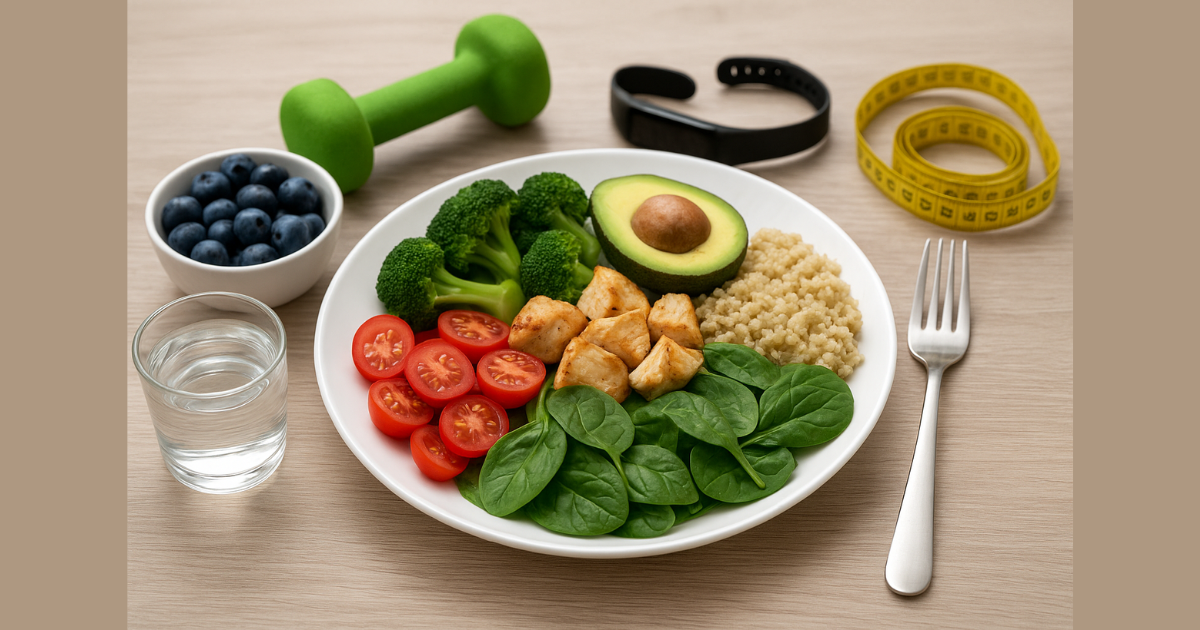Introduction: Why 2025 Is the Perfect Year to Prioritize Health
In 2025, health and fitness have taken center stage like never before. With more people working remotely, digital health tools advancing, and new research reshaping our understanding of nutrition, there’s no better time to adopt healthier eating habits and lose weight effectively. Unlike quick-fix crash diets of the past, the focus now is on sustainable, enjoyable, and science-backed approaches that promote both longevity and well-being.
If your goal is to shed pounds while feeling more energized and confident, this guide will walk you through the best strategies to eat healthy and lose weight in 2025—without sacrificing flavor or fun.
Understanding the Connection Between Diet and Weight Loss
The Role of Nutrition in Sustainable Fat Loss
Weight loss is ultimately about creating a calorie deficit, but how you get there matters. Instead of simply cutting calories, focusing on nutrient-dense foods ensures your body gets essential vitamins, minerals, and protein while still promoting fat loss. For example, swapping refined carbs for whole grains helps keep you fuller longer and supports better blood sugar control.
Common Myths About Dieting in 2025
Even in 2025, some diet myths persist:
- The quickest way to lose weight is to skip meals.
- Carbs are the enemy.
- Supplements can replace real food.
The truth? Balanced eating that includes healthy carbs, proteins, and fats is the foundation of lasting weight management.
Smart Food Choices for a Healthy Lifestyle
Whole Foods vs. Processed Foods
Whole foods like fresh fruits, vegetables, lean meats, and nuts remain the cornerstone of weight loss. Processed foods, even those marketed as “healthy,” often contain added sugars, preservatives, and excess sodium that stall progress.
Plant-Based and Flexitarian Diets
Plant-based diets have soared in popularity due to their heart-health benefits, lower calorie density, and sustainability. Flexitarian approaches—mostly plant-based with occasional animal products—are especially popular in 2025 for their balance and flexibility.
The Importance of Portion Control
When consumed in excess, even nutritious meals can cause weight gain. Portion control is key. Tools like smaller plates, mindful eating techniques, and AI-powered apps help people keep portions in check without feeling deprived.
Trending Diet Approaches in 2025
Intermittent Fasting 2.0
Intermittent fasting isn’t new, but in 2025 it has evolved into a personalized approach, guided by wearable tech that tracks glucose and energy levels. This allows people to tailor fasting windows to their unique metabolism.
Personalized Nutrition Powered by AI
AI has transformed dieting. Apps now analyze DNA, gut microbiome data, and daily habits to suggest tailor-made diets. Instead of generic meal plans, people follow what works best for their own biology.
Low-Carb, High-Protein Evolution
The classic low-carb diet has been upgraded with more emphasis on quality protein sources like plant-based protein powders, grass-fed meats, and fermented dairy for gut health.
Effective Meal Planning and Preparation
Weekly Meal Prep Strategies
Meal prep remains one of the most effective weight-loss hacks. By cooking in bulk, you save time, reduce temptation, and always have healthy options available.
Budget-Friendly Healthy Eating Tips
Contrary to popular belief, eating healthy in 2025 doesn’t have to break the bank. Frozen fruits and veggies, seasonal produce, and affordable protein sources like beans and lentils are wallet-friendly staples.
Fitness and Movement for Lasting Weight Loss
Strength Training vs. Cardio
When it comes to losing weight, both cardio and strength training matter. Cardio burns calories quickly, while strength training builds muscle, which increases metabolism even at rest. In 2025, fitness experts recommend combining the two for maximum results. Three days of strength training paired with two to three days of cardio strikes the right balance for most people.
Micro-Workouts and Desk Exercises
With many people still working from home or spending long hours at a desk, micro-workouts have become a game changer. These short, 5–10-minute bursts of activity—like squats, push-ups, or resistance band exercises—add up throughout the day and help burn calories without needing hours in the gym.
The Role of Technology in Healthy Living
Smart Wearables and Calorie Tracking
Fitness trackers in 2025 have moved beyond step counting. They now monitor blood sugar, hydration, stress levels, and even gut health. This helps users make smarter food choices in real time and keeps them accountable.
AI-Powered Nutrition Coaching Apps
Nutrition apps no longer just track calories—they now act as personal health coaches. AI-driven platforms provide tailored meal plans, analyze progress, and even send reminders when it’s time to drink water or prepare a healthy snack.
Mindset and Behavior Changes for Success
Overcoming Emotional Eating
Many people struggle with eating in response to stress, boredom, or sadness. In 2025, strategies like mindful eating, journaling, and stress-reduction practices (yoga, meditation) are recommended to overcome emotional eating patterns.
Building Long-Term Healthy Habits
Quick results may motivate in the short term, but the real key to weight loss is habit formation. Simple shifts—like cooking at home more often, walking after meals, and scheduling workouts like meetings—make healthy living second nature.
Hydration, Sleep, and Stress Management
Why Water Is Still the Ultimate Weight-Loss Drink
Despite all the new supplements and drinks on the market, plain water remains the best option for hydration and weight control. Drinking a glass of water before meals helps reduce overeating and supports digestion.
The Sleep-Weight Connection
Research in 2025 continues to show that poor sleep disrupts hormones that regulate hunger and metabolism. Adults who consistently get 7–9 hours of quality sleep have an easier time maintaining a healthy weight.
Managing Stress Without Comfort Food
Chronic stress raises cortisol levels, which can lead to fat storage, especially around the belly. Techniques like deep breathing, mindfulness, and time outdoors are proven ways to keep stress in check without turning to junk food.
Supplements and Superfoods in 2025
Natural Metabolism Boosters
Supplements like green tea extract, caffeine in moderation, and apple cider vinegar remain popular metabolism boosters. However, experts stress they should be viewed as add-ons to a healthy lifestyle, not magic fixes.
Probiotics and Gut Health
Gut health has taken the spotlight in 2025. Probiotics from yogurt, kimchi, and supplements help balance the microbiome, improving digestion and supporting weight management.
Omega-3s and Brain Health
Omega-3 fatty acids from fish, chia seeds, and algae oil not only improve brain function but also reduce inflammation, making it easier to lose weight and maintain overall health.
Mistakes to Avoid While Trying to Eat Healthy
Relying Too Much on Fad Diets
Trendy diets promise quick results but often fail in the long term. Most people regain the weight once they return to their old habits. Instead, focus on sustainable changes you can stick to.
Ignoring Hidden Calories in “Healthy” Foods
Even so-called healthy snacks can be calorie bombs. Protein bars, smoothies, and nut butters are nutritious but easy to overeat. Reading labels and practicing portion control help avoid this pitfall.
FAQs About Eating Healthy and Losing Weight in 2025
1. What is the fastest way to lose weight in 2025?
The fastest and safest way is through a balanced diet combined with regular exercise. Avoid extreme crash diets, as they lead to rebound weight gain.
2. Are AI nutrition apps reliable for weight loss?
Yes, AI-powered apps in 2025 are highly advanced and provide personalized recommendations. However, they work best when paired with professional advice from doctors or dietitians.
3. Can I still enjoy cheat meals and lose weight?
Absolutely. Occasional indulgences help you stay consistent long term. The key is moderation—plan your cheat meals instead of letting them derail your progress.
4. What foods should I avoid for weight loss?
Limit highly processed foods, sugary drinks, and fried items. Instead, focus on whole, nutrient-dense options that keep you fuller longer.
5. How important is exercise compared to diet?
Both matter, but diet typically has a greater impact on weight loss, while exercise enhances fitness, metabolism, and overall health. Together, they’re a winning combination.
6. Do supplements work for weight loss in 2025?
Some supplements like probiotics and omega-3s support health, but none replace a balanced diet. Always consult a healthcare provider before starting new supplements.
Conclusion: A Balanced Path to Health and Weight Loss in 2025
The best ways to eat healthy and lose weight in 2025 aren’t about restrictions or quick fixes—they’re about balance, smart choices, and sustainable habits. By combining nutrient-rich foods, personalized diet plans, technology, exercise, and mindset shifts, you can achieve lasting weight loss while still enjoying life.
The future of health is here, and with the right tools and strategies, 2025 can be the year you transform your lifestyle for good.

